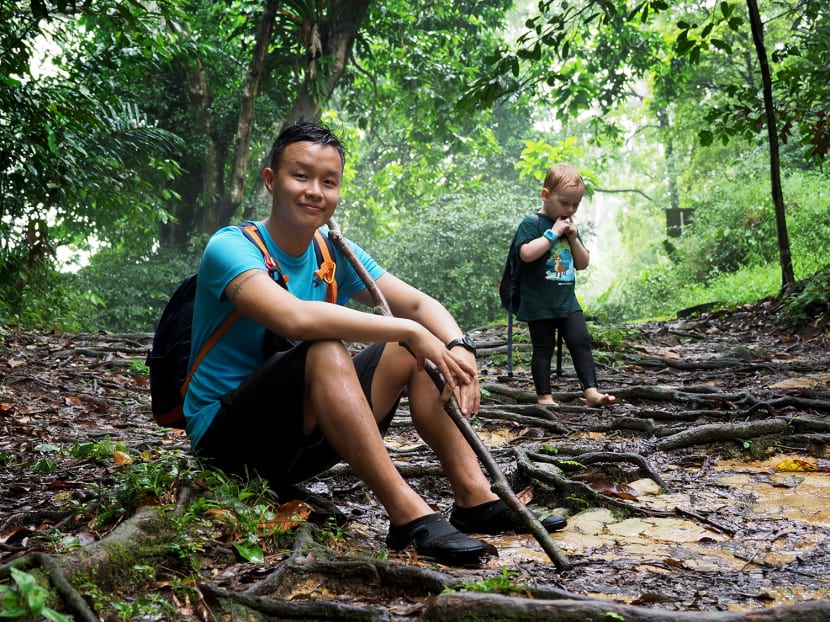Singapore's first 'forest school' for kids to learn amid nature to close, founder says parents prefer tuition instead
SINGAPORE — A nature-centric classroom that allowed preschool children to pick up outdoor skills by roaming freely in a forested area will be shutting its doors towards the end of next year, with its founder saying that parents prefer other after-school options such as tuition — for their children.

Darren Quek (left) pictured at Rifle Range Nature Park on Sept 7, 2018.
- Forest School Singapore, the first of its kind here, announced that it will cease operations in 2024
- Founder Darren Quek, 32, said that dwindling sign-ups and burnout made it difficult to continue
- Singapore parents would rather enrol their children for tuition classes than nature programmes, he noted
- Despite his decision, Mr Quek remains hopeful that nature-based learning has a place here
SINGAPORE — A nature-centric classroom that allowed preschool children to pick up outdoor skills by roaming freely in a forested area will be shutting its doors towards the end of next year, with its founder saying that parents prefer other after-school options such as tuition — for their children.
Forest School Singapore, which was founded by outdoor educator Darren Quek, previously made headlines for being the first of such schools here to feature an alternative forest-based outdoor education programme for children aged three to nine.
More than seven years after it was founded, the startup will have to shutter because the market for post-school activities for children have become increasingly saturated, Mr Quek told TODAY in a phone interview on Thursday evening (Dec 7).
The 32-year-old also said that it was because of his own personal struggles with burnout.
“(We) are not just competing with other forest schools for outdoor education; we are competing with academic enrichment classes.”
Enrolment figures had dwindled after the Covid-19 pandemic, which was in line with the lifting of pandemic restrictions for in-person private tuition, Mr Quek added.
The school, which used to take in around 160 children for its June holiday camps in 2022, saw registrations fall to half of that in June 2023.
“The reality that we face in Singapore is that (faced with a choice) between forest school or maths enrichment classes, maths classes will still triumph.”
Posting on Forest School Singapore's Instagram page on Dec 5, Mr Quek made the announcement that its last day will be on Nov 5, 2024.
The concept of forest schools that provide a biophilic form of education originated from Scandinavian countries, most notably Denmark and Sweden. There, forest schools were seen as an important part of early childhood education in the 1960s to boost self-confidence, teamwork, risk-taking skills, mental well-being and a love for nature.
Biophilia refers to the love of living things and nature, and some people believe that there is a human tendency to interact or be closely associated with other forms of life in nature.
The idea spread around the world over the years in Europe and the United Kingdom, as well as in Southeast Asia, when forest schools were set up in Malaysia in 2010.
Forest School Singapore, which was set up in 2016, was the first of its kind to take root here.
Mr Quek said: “From 2016 to 2018, there were fewer than 10 forest schools in Singapore. Currently, there are more than 70 (similar) initiatives in Singapore, with some in international schools, stand-alone outfits, and others practising it on different platforms.”
RISE AND FALL IN ENROLMENTS
When travel restrictions caused by the pandemic hit Singapore from 2020 to 2022, Mr Quek said that it brought about a surge in interest in forest schools across the country at a time when many businesses were succumbing to the global health crisis.
“Covid-19 was a very abnormal period because everybody could not travel. Most programmes could not do anything, so forest schools became the thing (for young children) to do. Every forest school programme enjoyed a large increase in (enrolment) volume.”
Before 2020, it took about a month for all slots in Forest School Singapore's classes to be snapped up. During the height of the pandemic, a week was all that was needed for classes to reach full capacity.
Then, with the global lifting of movement restrictions over the past year, sign-ups for forest schools plunged.
Singapore lifted all border measures in February this year, which Mr Quek believes was what halved Forest School Singapore's weekly enrolment in the June school holidays when compared with the end-of-year period in 2022. Other forest schools also reported similar dips, he said.
Forest School Singapore had "a lot more to compete with" when schools' co-curricular activities and private tuition classes kicked back into high gear, he added.
“I spent about the first half a year struggling to understand what was going on and how I felt,” Mr Quek said. “There was a lot of frustration and pain."
Closing the school was not a decision he took lightly as he ruminated over it for nearly six months before deciding in July this year to close the school.
PUSHBACK AND BURNOUT
Along with the dwindling numbers, Mr Quek also said that the burnout he experienced was one of the reasons why it was time to call it quits.
“When you do your own thing, like an entrepreneur, it is a 24/7 job. It doesn't matter if you are still on holiday; the business is still on your mind,” he added.
“Sometimes, I'll be so frustrated I’ll be crying and having a meltdown... There will be days when I’ll go to the park to shout."
In 2018, Mr Quek's programme received pushback from some nature conservationists, who were against the use of Rifle Range Nature Park for these activities, arguing that children running around in streams could hurt sensitive wildlife.
They eventually reached a compromise for the school to be more conscious of the wildlife at the park while it conducted its activities.
Despite his decision, Mr Quek still firmly believes that the forest school pedagogy concept has legs to run in Singapore, even if he will not be the one to lead the effort.
Just as nutrients from a fallen tree are "returned to nature" and allow other saplings to thrive, Mr Quek sees the decision to close Forest School Singapore as another step towards something new.
"Maybe there is still the possibility for a forest school for elders, given the ageing population, or people with dementia," he said. "I am sure there will be another door (opening)."











